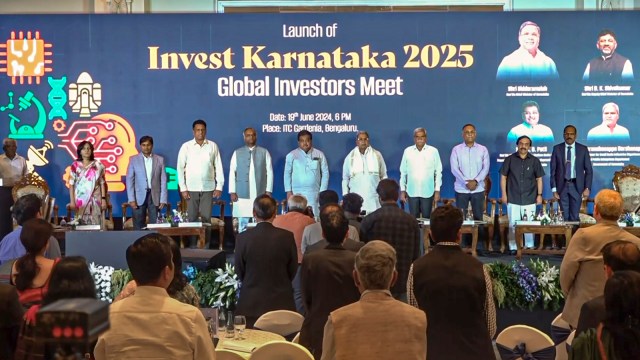Year after its 5 guarantees came into force, how Karnataka government is scrambling to generate more revenue
From hiking the sales tax on petrol and diesel to revising the guidance value of all properties, the Karnataka government is implementing several measures to improve its finances.
 Karnataka Chief Minister Siddaramaiah inaugurates the Global Investors Meet, in Bengaluru, Wednesday, June 19, 2024. (PTI Photo)
Karnataka Chief Minister Siddaramaiah inaugurates the Global Investors Meet, in Bengaluru, Wednesday, June 19, 2024. (PTI Photo) Generating additional revenue has been one of the main objectives of the Karnataka government ever since the implementation of its five guarantee schemes that cost almost a sixth (Rs 52,000 crore) of its Rs 3.46 lakh crore annual budget. Unhappy with the pace of resource mobilisation by various departments, the state government engaged Boston Consulting Group (BCG) earlier this year to devise measures to improve its revenue streams.
Among the prime recommendations of a draft submitted by the firm involved identifying new revenue sources and the suggestion to go for asset monetisation of government properties. The proposals also included measures to monetise around 25,000 acres of land near Bengaluru, which came under fire from the Opposition BJP as it accused the Congress government of selling off government properties.
As reports of the monetisation measure emerged, the Chief Minister’s Office (CMO) quickly issued a clarification. “..no proposal to monetise 25,000 acres of land..,” it said, noting that the state had “greater potential to raise additional non-tax revenue”. Rather than the outright sale of government land to generate funds, idle land parcels “would be developed to generate a continuous stream of revenue without selling these lands”, the statement read. But it did not dispute the fact that the state was looking at “innovative value capturing financing methods” to generate extra revenue.
Sources in the finance department say that the revenue generation measures implemented till date would ensure additional funds of around Rs 5,500 to Rs 6,000 crore. “The allegations that the state is short of funds is not true,” a senior official from the finance department said, adding that the government was always looking at measures to improve its revenue.
Admitting that there were challenges in implementing the guarantee schemes initially, the official said that the entire process was now streamlined. “The focus on value capture financing methods will continue as there is a potential to increase income,” the official added.
The 5 guarantees
Since Congress assumed power in Karnataka last May, state finances have come under scrutiny with critics alleging that the five guarantees – Shakti (free bus ride for women), Gruha Lakshmi (Rs 2,000 per month for women head of the family), Gruha Jyothi (up to 200 units of free power), Anna Bhagya (free 5 kg rice per month for every member of the family) and Yuva Nidhi (unemployment allowance for graduates and diploma holders) – would bankrupt the state.
How these schemes would benefit the economy is still under debate. Interestingly, revenue generated by Karnataka State Road Transport Corporation (KSRTC) increased by 17 per cent in 2023 despite the implementation of the Shakti scheme. Compared to Rs 3,349 crore revenue in 2022, KSRTC recorded a revenue of Rs 3,930 crore in 2023. The scheme was rolled out in June 2023, after which around 250 crore free bus trips were availed by women in a year.
A study by the state-run Fiscal Policy Institute quantified the impact of the scheme to assert that it had contributed to the increase in GST collection, apart from improving female participation in the workforce. It estimated that the additional GST generated due to the scheme was around Rs 371.57 crore. While Anna Bhagya is credited with having reduced malnutrition in several pockets of the state, the economic benefits of the three remaining schemes are still a matter of research.
It is no secret that the populist welfare measures are allocated a sizable chunk from the state treasury, leading to complaints of stagnation in development works.
Last year, soon after the first four guarantees were implemented, Deputy Chief Minister D K Shivakumar had asked party legislators not to seek funds for development works in their constituencies as a lion’s share of funds went to finance the schemes. Prior to that, a letter by 11 Congress MLAs complaining of the paucity of funds was leaked to the media.
With resources in short supply, the Congress government went on the warpath with the central government, accusing it of hurting state finances by reducing allocation. A protest was also held in February this year as Congress doubled down to secure what it called Karnataka’s rightful share in revenue disbursed by the Centre.
One of the common refrains from Chief Minister Siddaramaiah during the ‘My Tax, My Right’ campaign was that while Karnataka contributed Rs 4.3 lakh crore to the central exchequer, it got back only around Rs 50,000 cr.
Revenue generation
Soon after the Lok Sabha elections, Siddaramaiah chaired a review meeting with officials from key revenue-generating departments – Commercial Taxes, Stamps and Registration, Stamps, Excise and Mining – and is learnt to have been unhappy about the progress. It was days after this meeting that the Congress government decided to hike the sales tax of petrol and diesel by Rs 3 each, eyeing an additional revenue of around Rs 2,500 crore.
However, this was not the only measure implemented to improve state revenue. For instance, the guidance value of all properties saw an upward revision by around 30 per cent from October 1 last year. According to Revenue Minister Krishna Byre Gowda, the move was essential as the values were not revised in five years, despite rules mandating revision every year. This increase was expected to generate an additional Rs 2,000 crore in revenue for the Stamps and Registration Department.
Among other measures implemented to improve the finances included revision of liquor prices, hiking stamp duty charges, along with proposals to levy fees for collection of solid waste from households in Bengaluru and proposed revision of fees for mining licences, among others.
After the government roped in BCG – it is also the knowledge partner for Karnataka’s Global Investors’ Meet scheduled in February 2025 – it has made several recommendations to further boost the income of the cash-strapped government. The firm has started working with the Finance Department to streamline expenditure, enhance tax and non-tax revenue, and adopt measures for asset monetisation, among others.
The appointment of BCG for a cost of Rs 9.5 crore for six months did not sit well with the Opposition. However, the clamour died down when the government noted that the same firm was employed by the erstwhile BJP government during various investor meets.







